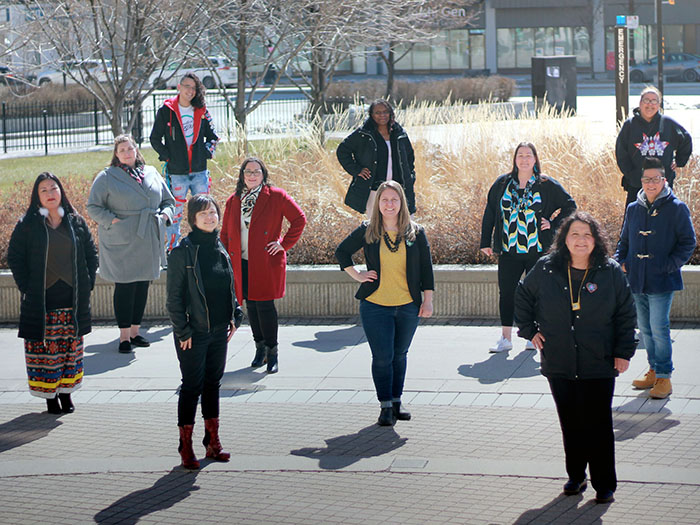Manitoba Network Environment for Indigenous Health Research
Kishaadigeh is a NEIHR that offers support to Indigenous Peoples in Manitoba through ethical partnerships with five organizations
Dr. Jaime Cidro, Associate Vice President for Research and Innovation, University of Winnipeg

NEIHR-Manitoba representatives: (back row, from L to R) Michael Redhead Champagne, Co-Founder, Fearless R2W; Paula Hendrickson, Director of Services, Aboriginal Health and Wellness Centre of Winnipeg, Inc.; Mary Burton, Co-founder and Executive Director, Fearless R2W; (middle row, from L to R) Dr. Erin Millions, Research Director, Manitoba Indigenous Tuberculosis Photo Project; Dr. Jaime Cidro, Nominated principal investigator; Monica Cyr, Director of Primary Care, Aboriginal Health and Wellness Centre of Winnipeg, Inc.; Vanessa Tait, Research Ethics Coordinator, First Nations Health and Social Secretariat of Manitoba (FNHSSM) (front row, L to R) Leona Star, Director of Research, First Nations Health and Social Secretariat of Manitoba; Larissa Wodtke, Senior Research Associate, University of Winnipeg; Ashley Hayward, Kishaadigeh NEIHR Coordinator, University of Winnipeg; Della Herrera, Executive Director, Aboriginal Health and Wellness Centre of Winnipeg, Inc.
With the largest CIHR grant ever given to the University of Winnipeg, Dr. Jaime Cidro developed Kishaadigeh (which in Anishinaabemowin means “she who guards the lodge”) as a Network Environment for Indigenous Health Research (NEIHR) that will increase research capacity, improve infrastructure and develop research lodges for five partner organizations: First Nations Health and Social Secretariat of Manitoba (FNHSSM), the Manitoba Association of Friendship Centres (MAC), the Manitoba Inuit Association (MIA), the Aboriginal Health & Wellness Centre of Winnipeg (AHWC Wellness/Clinic), and Fearless R2W. Each organization provides best practices for their research projects that reflect their values and priorities. Thanks to this NEIHR, FNHSSM has funded their First Nations regional ethics board and the Health Information Research Governance Committee, while the MAC has developed a digital storytelling project that catalogues and preserves their local archives. The AHWC Wellness/Clinic has responded to the COVID-19 pandemic by developing a community-based testing centre for the virus, and creating access to an immunization clinic for Indigenous people living in and around urban centres. The MIA is prioritizing COVID-19 support by providing emergency food hampers and a pop-up vaccine clinic for the Manitoba Inuit population. Fearless R2W has been able to continue its parent advocacy programs online, and will give students and community members the chance to register for a week-long course in August (co-designed by graduate student Darrien Morton) so that they can learn about the engagement of grassroots Indigenous organizations and activists. Completing this course will result in either an academic credit or a University of Winnipeg certificate.
“While each of the five organizations has a different focus, they are all undertaking incredible work that will benefit either the health or education of their Indigenous communities,” said Dr. Cidro. “By working with them, this NEIHR emphasizes how ethical partnerships in Indigenous research can lead to the prioritization of self-determination in research and collaborations with representatives from the Blackfoot Confederacy, the University of Manitoba, the University of Toronto, the University of Ottawa, Ryerson University, and the University of Calgary.”
- Date modified: